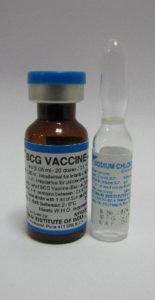Tuberculosis (TB) is the leading cause of death due to infectious diseases worldwide. One of the approaches to end the TB epidemic is the development of efficacious vaccines aimed at preventing progression to TB disease. Testing this approach is very costly because large numbers of individuals are required to demonstrate efficacy, as approximately 2-10% of Mycobacterium tuberculosis (Mtb) exposed individuals develop TB. This has led to the development an innovative vaccine trial that aims at preventing Mtb infection, also known as prevention of infection (POI). POI trials are considered as a proof of concept, stage gate criteria for potential TB vaccines to progress to phase 2b/3 prevention of TB disease clinical trials.
Researchers at the University of Cape Town conducted a phase 2 prevention of Mtb infection clinical trial. The first trial of its kind conducted in a high TB endemic region of Cape Town (South Africa), where BCG is routinely given at birth. Participants of the trial were either vaccinated with H4:IC31, candidate subunit vaccine consisting of fusion protein H4 (Ag85B and TB10.4 antigens) and IC31 adjuvant, revaccinated with BCG or placebo. The primary efficacy endpoint of this trial was the prevention of Mtb infection determined by QuantiFERON-TB Gold in Tube test (QFT) conversion. The secondary efficacy endpoint was prevention of sustained QFT conversion, as a proxy for Mtb clearance or containment.
Vaccination with H4:IC31 was safe and immunogenic, significantly inducing CD4 T cells capable of producing IFN-γ and/or IL-2. BCG revaccination was also safe and highly immunogenic significantly inducing CD4 T cells capable of producing IFN-γ and/or IL-2. Surprisingly, despite BCG harbouring both Ag85B and TB10.4 antigens, BCG revaccination did not significantly induce these CD4-antigen specific responses, suggesting that BCG vaccination does not induce robust CD4 T cells responses.
Researchers observed that neither BCG nor H4:IC31 were able to prevent Mtb infection (primary endpoint). Interestingly, at a 95% confidence interval BCG vaccination was able to prevent sustained QFT conversion with a vaccine efficacy of 45.4%. Additionally, the trial also demonstrated the potential efficacy (30.5% at a 80% confidence interval) of a subunit vaccine (H4:IC31) at preventing sustained Mtb infection.
In summary, this study represents the first trial of prevention of M.tb infection in a TB endemic region. It is also the first randomized control trial showing the potential for BCG revaccination efficacy against M.tb infection, whether this translates to prevention of TB diseases is unknown and requires testing in a large clinical trial.
QuantiFERON-TB Gold in Tube test (QFT): is an immunological assay that is used to determine the immunological sensitization to Mtb antigens CFP-10, ESAT-6 and TB7.7. A QFT-positive responses is a proxy for Mtb infection, as there is no tool to directly measure Mtb bacteria in individuals who do not have TB disease.
Journal Article: Nemes et al., 2018. Prevention of M. tuberculosis Infection with H4:IC31 Vaccine or BCG Revaccination. NEJM.
Article by Cheleka Mpande











